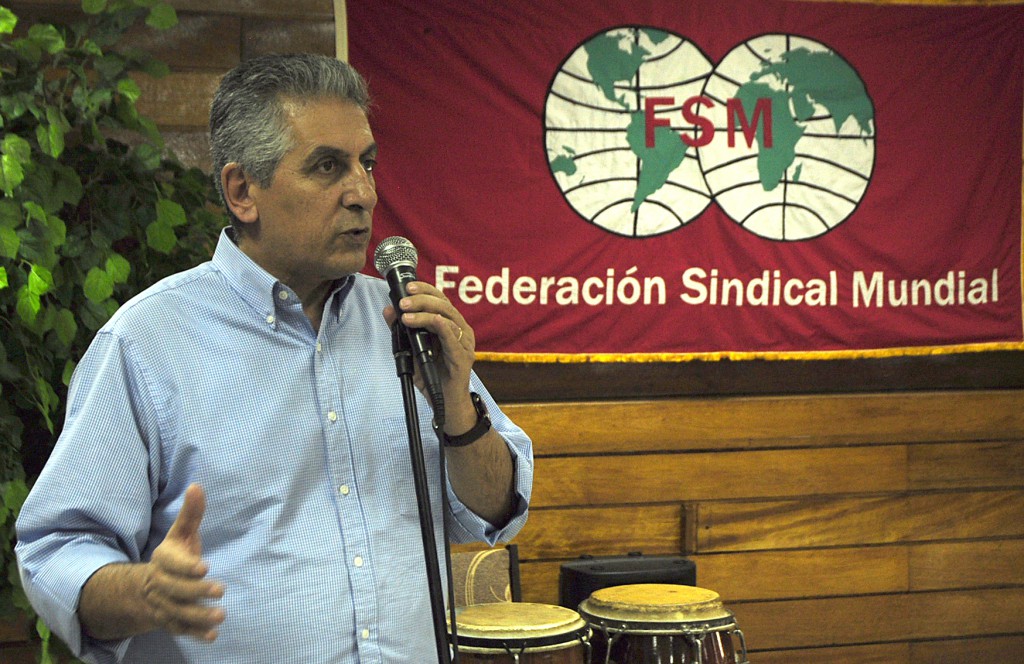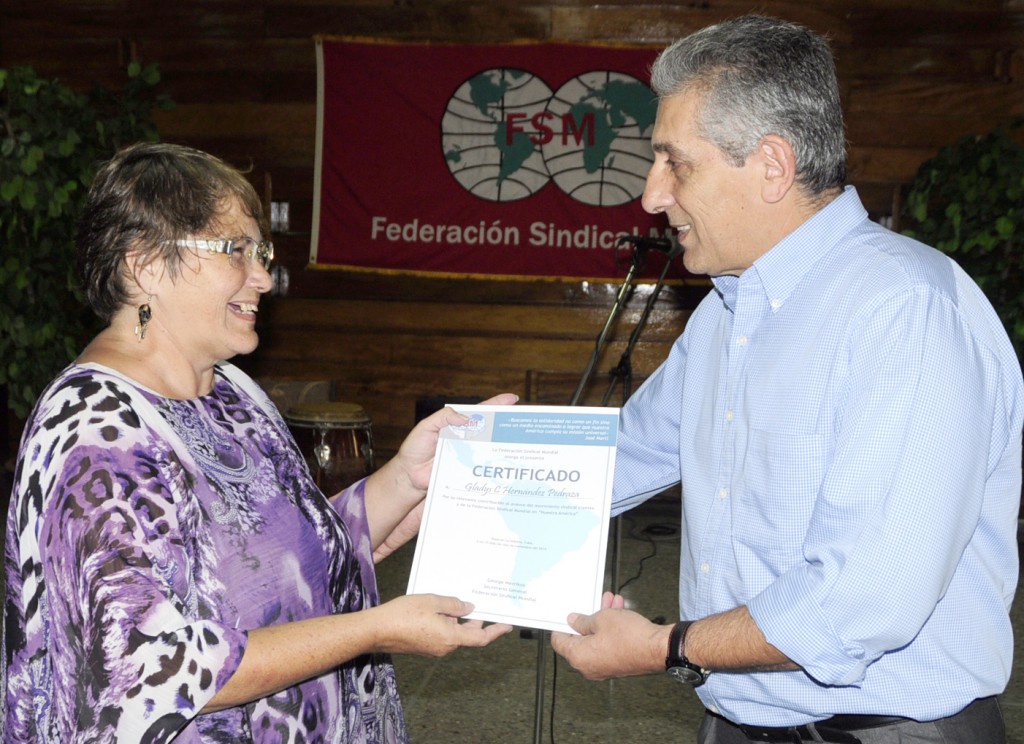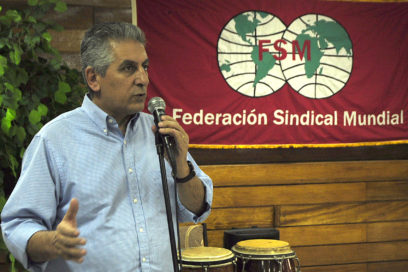
The secretary of the World Union Federation, George Mavrikos is back in Cuba. It is the eight times he visits us and every time, there are more fraternal relations that join him to the Cuban union movement: “Comrades from the WUF are always happy to come to Cuba and see the protagonist role of the Cuban Workers Federation (CTC) and the changes taking place in Cuba,” he said.
During his stay there was an exchange between the Cuban union leaders from the CTC and also from other provinces like Villa Clara and Pinar del Rio. On Monday, November 17, he delivered a magisterial class at the venue of the CTC, about the challenges and perspectives of the organization he leads.
After about 70 years of its foundation, what are the worries that move today the WUF?
Those problems the workers have due to the world capitalist crisis. The one we are living at present is really deep and prolonged. Its main victims are the working class and the poor farmers.
I come from Greece and there, in official figures, we have 1,5 million unemployed workers from a total of 11,3 millions of inhabitants. If we include part time employees or having precarious jobs, the number will exceed the 2 millions. Unemployment increases worldwide, but wages and pensions decrease. In the last years they have decreased the 30 percent. So, last October 3, we organized the International Day of Action against Unemployment where more than 45 countries participated with marches, meetings and mobilizations.
In the last years, social security has been seriously damaged, and another consequence of the current crisis is the generalization in privatizations, above all in branches of strategic importance. We are worried on how much has increased the imperialist aggression in different parts of the world. The most recent event in Ukraine, Syria, Libya, Iran, Iraq, show the situation is dangerous. We have also seen how much defamations have increased against the governments of Venezuela and Bolivia. All these things due to the crisis, has brought the increase of neo-fascist trends, mainly in Europe.
Is there any proposal of solution by WUF?
Socialism is the only valid proposal in front of a rotten system like capitalism, but at the same time we are trying to find solutions to daily problems in the working class, like the right to work, retire and social, labor and health security, also to environment and other topics. We are also demanding the democratization of international organizations. The blockade imposed by the United States against Cuba is an example of what happens in those organizations. Every year, in the UN National Assembly, just 2 countries vote against the resolution demanding the lifting of the blockade. We already have 7212 documents similar that claim for the creation of the Palestine State. None of them have been reality. They are resolutions that are never fulfilled. In front of that, where is democracy?
But this battle where we are needs to improve the level of conscience of the workers, so they understand that the struggle should be for more radical changes.
Negotiation has become an opportunity to solve labor conflicts, but they need to be prepared for them.

What does WUF do to have a good training of the union leaders?
WUF has institutions worldwide, where very well trained specialists participate. In Cuba, for instance, we have the collaboration of professionals from centers of Hemispherical Studies and on the United States (CEHSEU), from the University of Havana; of investigations on International Policy (CIPI), and the Economy Worldwide (CIEM); and the National School to train leaders Lazaro Peña. Due to its contribution to the preparation of the union leaders, above all in Latin America and the Caribbean, we have granted them a special recognition to all of them in this visit.
We were in Vietnam two months ago. There, together with the Workers General confederation (CGTV), we organized a great event to talk about the collective negotiation. Unions from the entire Asian continent participated. That is part of the activities carried out by WUF that organizes courses, seminars and publications in pursue to the training of its leaders, but the most important thing is still the actions, there is no union life without it.
Strike appears in Agreement 87 of the International Labor Organization (ILO) (1948) as one of the principal rights of the workers.
Do you consider that this method to fight preserves its essence? What other ways of struggles have you included?
The right to go on strike is in danger. During the last two years the capital and the capitalist employers have been attacking it systematically, the most recent hit took place some days ago, when the Managing Council of ILO met and decided to send the topic of reading Agreement 87 to the International Court of Justice.
Working class has lost rivers of blood, since the period of the Heroes from Chicago, fighting for the right to go on strike that is why, it is non-negotiable.
Nevertheless, WUF does not exclude any way of struggle. We use all of them and also of the new technologies, although we do not venerate them.
Some people try to convince us it is better to do it by Internet: buy food, meet people, and fall in love”. The real fact is that they pretend to end with alive communication between people, avoid we see face to face and also understand the feeling of other people.
We agree with the new technologies and apply them in our struggle, but also using the historical methods we have used with success. We believe on the direct communication, in the participation in the life of the unions.
You have just visited Ecuador, Venezuela and Panama. What are your impressions in the situation of the working class in Latin America?
The working class worldwide is facing problems and difficulties. Unions affiliated to WUF in each country make efforts to solve them. Mainly in Ecuador, Panama and Venezuela there is a strong presence of our organization. In this trip, we have expressed our solidarity gesture with all of them, and particularly with the Venezuelan people and the Bolivarian State. We declared we are together with them against the imperialist aggression. There we saw a fighting spirit and an organization on the base that tells of their capacity and wish to fight against the enemies of the Revolution.
In those countries we visited, we got a good opinion about the leadership of the CTC in the region.
Cuba will soon host the summits of Caricom and ALBA, integrator organism celebrating its 10 years of foundation. Which is your opinion about these projects of regional integration, how do they influence in the life conditions of the workers?
Each regional integration organization has its peculiarities, they respond to different processes. The European Union (EU), for instance, is capitalist and kills the rights of the workers every day. In the case of ALBA and Caricom, taking into consideration the leadership of Cuba, Venezuela and the combative unions of the region, I would dare say it is a different process.
Among the recognized personalities by the World Union Federation, due to her support to the training of the union leaders of the region, there were the researchers Gladys Hernandez Peraza (in the photo) and Blanca Munster Infante, both from Ciem, Santiago Espinosa Bejerano, from Cipi and the journalist Orestes Eugelles among others.


